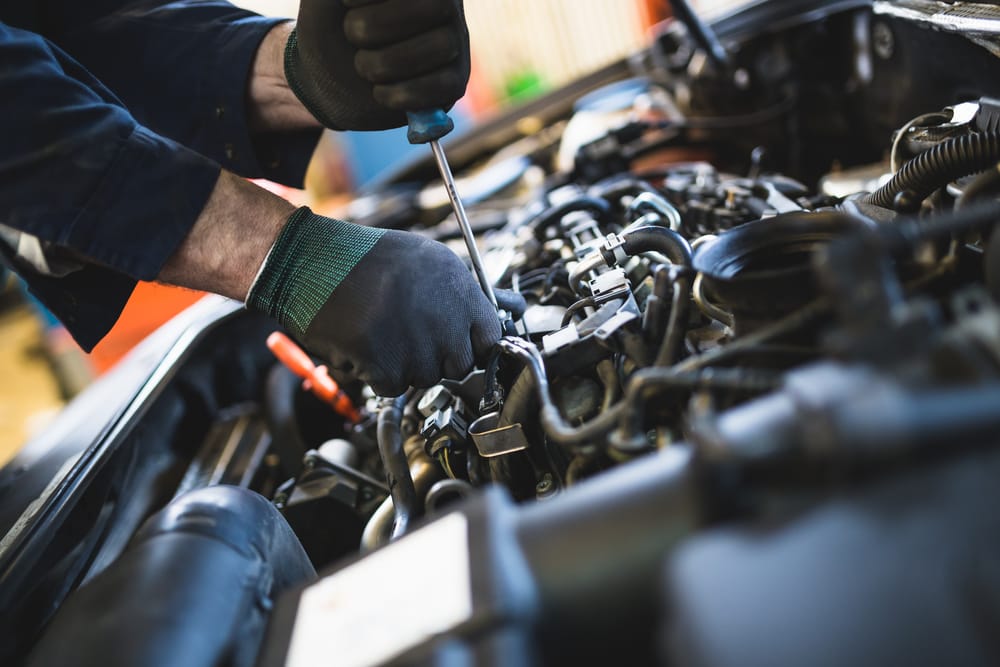
Whether you're hoping to gain a little extra horsepower, want a more
responsive car, or just wondering what else you can get out of your stock
car, you may be curious about tuning it.
You can definitely tune a stock car for a little performance boost, but
a tune alone won't help much without additional performance parts to go
along with it. So you should always have your car tuned by an
experienced professional, or you could damage your engine.
Read on to learn more about the pros and cons of tuning your stock car.
 Two mechanics tuning a car with a laptop on a dyno.
Two mechanics tuning a car with a laptop on a dyno.
What Does Tuning A Car Mean?
Tuning a car is using a computer to change some of the programmed factory
settings that the manufacturer initially set.
Your car is programmed to meet specific standards for fuel efficiency,
emissions, and engine noise. The factory also sets your top speed limit and
throttle rev limit.
A tuning specialist can use a programming computer to change some of your
car's engine computer settings.
Your air/fuel intake ratio, engine timing, throttle response, and other
measurements can be adjusted during an engine tuning.
How Much HP Can A Tune Add To A Stock Car?
A stock car with no other aftermarket performance parts may only see a
slight boost in horsepower from an engine tune.
Anywhere between 5 to 20 extra horsepower could be added to your car's
performance with just a tune alone.
There are several different ways to adjust your preset values in your
engine computer, so a lot of the potential gain in horsepower comes down to
the technician's skill.
The unfortunate downside is that the horsepower increase you may get from a
tune will almost always cost you gas mileage.
Can A Stock ECU Be Tuned?
A stock ECU, or engine control unit, can usually be tuned without replacing
it.
Most ECUs can be connected to a programming computer without additional
parts.
Some ECUs have to have an aftermarket chip installed to be able to be
appropriately tuned.
You can sometimes install these programming chips at home, but it's best to
let a tuning specialist install them.
 Tuning a car engine.
Tuning a car engine.
How Much Does It Cost To Tune Your Car?
The cost of tuning your car depends on the work done and the tuning
specialist doing the tune.
An average expected cost of a tune could be between $500 and $1000 for the
actual computer work and another $100 to $200 for a dyno run to measure the
effects.
One run on a dyno may not be enough to complete the tune correctly, so you
may need two or three dyno runs to ensure everything works perfectly.
Can All Cars Be Tuned?
Unfortunately, not all cars can be tuned. Some cars have engine computers
that can't be easily adjusted without damaging them.
Other cars require certain programming to run correctly, and any changes in
those programmed values will negatively affect how the car drives.
Can You Damage A Car From Tuning It?
As exciting as gaining a little extra horsepower for your car can be, it's
good to be cautious about having your car tuned.
Changing the factory-programmed setting on the ECU can cause problems with
your car.
A car that changes its engine timing can experience engine knock, which is
caused when the air/fuel mixture combusts before the cylinder fully
compresses it.
This can cause premature engine wear over time and can lead to expensive
repairs being necessary.
Tuning an engine for power can also negatively affect the transmission
since it has to accommodate for the extra torque being put on it by the
engine.
Removing the rev limiter can cause you to throttle your engine too hard,
damaging the engine accidentally.
Several ways tuning your car can potentially damage it, so keep that in
mind before you decide to have it tuned.
Is It Legal To Tune Your Car?
As long as you still comply with noise and emission standards, it's usually
legal to have it tuned.
A tuning specialist will know the proper ways to tune a car that keeps it
street-legal, so this is another reason you should have your car
professionally tuned.
If you attempt to do it yourself, not only could you damage your ECU or
your car itself, you could potentially cause legal trouble if it isn't done
correctly.
Another thing to consider is that if you want to sell your car, you will
probably need to have the tune removed and restored to factory settings.
Some dealerships may reject the car because its factory settings were
changed, making it hard to warranty the car.
Conclusion
Most stock cars can be tuned by a professional with experience tuning an
engine computer.
This can be a fun way to add a bit of extra power to your car, but it can
also be expensive and lead to premature wear and tear.
All these things should be considered when deciding if you want to tune
your stock car.